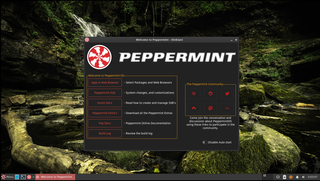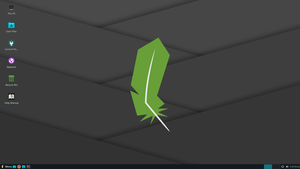
A Linux distribution is an operating system made from a software collection that includes the Linux kernel, and often a package management system. Linux users usually obtain their operating system by downloading one of the Linux distributions, which are available for a wide variety of systems ranging from embedded devices and personal computers to powerful supercomputers.
Libranet was an operating system based on Debian.

A light-weight Linux distribution is one that uses lower memory and/or has less processor-speed requirements than a more "feature-rich" Linux distribution. The lower demands on hardware ideally result in a more responsive machine, and/or allow devices with fewer system resources to be used productively. The lower memory and/or processor-speed requirements are achieved by avoiding software bloat, i.e. by leaving out features that are perceived to have little or no practical use or advantage, or for which there is no or low demand.
Puppy Linux is an operating system and family of light-weight Linux distributions that focus on ease of use and minimal memory footprint. The entire system can be run from random-access memory (RAM) with current versions generally taking up about 600 MB (64-bit), 300 MB (32-bit), allowing the boot medium to be removed after the operating system has started. Applications such as AbiWord, Gnumeric and MPlayer are included, along with a choice of lightweight web browsers and a utility for downloading other packages. The distribution was originally developed by Barry Kauler and other members of the community, until Kauler retired in 2013. The tool Woof can build a Puppy Linux distribution from the binary packages of other Linux distributions.

Kubuntu is an official flavor of the Ubuntu operating system that uses the KDE Plasma Desktop instead of the GNOME desktop environment. As part of the Ubuntu project, Kubuntu uses the same underlying systems. Kubuntu shares the same repositories as Ubuntu and is released regularly on the same schedule as Ubuntu.
Freespire is a community-driven Linux distribution currently owned by PC/Open Systems LLC. It is derived from Linspire and is composed mostly of free, open source software, while providing users the choice of including proprietary software including multimedia codecs, device drivers and application software.

Xubuntu is a Canonical Ltd.–recognized, community-maintained derivative of the Ubuntu operating system. The name Xubuntu is a portmanteau of Xfce and Ubuntu, as it uses the Xfce desktop environment, instead of Ubuntu's customized GNOME desktop.

gNewSense was a Linux distribution, active from 2006 to 2016. It was based on Debian, and developed with sponsorship from the Free Software Foundation. Its goal was user-friendliness, but with all proprietary and non-free software removed. The Free Software Foundation considered gNewSense to be composed entirely of free software.

Linux Mint is a community-driven Linux distribution based on Ubuntu, bundled with a variety of free and open-source applications. It can provide full out-of-the-box multimedia support for those who choose to include proprietary software such as multimedia codecs. Compared to Ubuntu, it uses the Cinnamon interface by default, using a different, more traditional layout that can be customized by dragging the applets and creating panels. New applets can also be downloaded.

CrunchBang Linux was a Linux distribution derived from Debian by Philip Newborough.

Peppermint OS is a Linux distribution based on Debian and Devuan Stable, and formerly based on Ubuntu. It uses the Xfce desktop environment. It aims to provide a familiar environment for newcomers to Linux, which requires relatively low hardware resources to run.

Bodhi Linux is a light-weight Linux distribution based on Ubuntu that uses an Enlightenment DR17-based fork called Moksha. The philosophy for the distribution is to provide a minimal base system so that users can install the software they want. In turn, the distribution only includes software that is essential to most users, such as a file manager (Thunar), a terminal emulator (Terminology), and a web browser. To install additional software, Bodhi Linux developers maintain a browser-based app store that uses apturl to install programs.

Linspire is a commercial operating system based on Debian and Ubuntu and currently owned by PC/OpenSystems LLC. It had been owned by Linspire. Inc. from 2001 to 2008, and then by Xandros from 2008 to 2017.

Ubuntu Kylin is the official Chinese version of the Ubuntu computer operating system. It is intended for desktop and laptop computers, and has been described as a "loose continuation of the Chinese Kylin OS". In 2013, Canonical Ltd. reached an agreement with the Ministry of Industry and Information Technology to co-create and release an Ubuntu-based operating system with features targeted at the Chinese market.

Emmabuntüs is a Linux distribution derived from Debian and designed to facilitate the restoration of computers donated to humanitarian organizations like the Emmaüs Communities.

SparkyLinux is a desktop-oriented operating system based on the Debian operating system. The project offers a ready to use operating system with various desktops to choose from. SparkyLinux is released 3-4 times per year to provide the latest versions of all applications.

Zorin OS is a Linux distribution based on Ubuntu. It uses a GNOME 3 and XFCE 4 desktop environment by default, although the desktop is heavily customized in order to help users transition from Windows and macOS easily. Wine and PlayOnLinux are supported, allowing users to run compatible Windows software, like Microsoft Office. Its creators maintain three free editions of the operating system, and sell a professional edition.

Pop!_OS is a free and open-source Linux distribution, based on Ubuntu, and featuring a customized GNOME desktop environment known as COSMIC. The distribution is developed by American Linux computer manufacturer System76. Pop!_OS is primarily built to be bundled with the computers built by System76, but can also be downloaded and installed on most computers.

Q4OS is a light-weight Linux distribution, based on Debian, targeted as a replacement for operating systems that are no longer supported on outdated hardware. The distribution is known for an addon called XPQ4, which adds themes intended to replicate the look and feel of Windows 2000 and Windows XP.























